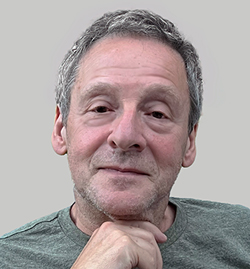Global health mentorship today: Ilya Raskin, PhD
July/August 2024 | Volume 23 Number 4
 Photo courtesy of Ilya Raskin
Ilya Raskin, PhD
Photo courtesy of Ilya Raskin
Ilya Raskin, PhD
Dr. Ilya Raskin is a Distinguished Professor at Rutgers, The State University of New Jersey.
I left the Soviet Union in 1976 and became a scientist here. I’ve worked with plant biochemistry for 38 years. Probably 30% to 40% of new chemical ingredients for drugs come from plants. The use of traditional, botanical medicines, which many people still rely on, is mostly supported by anecdotal evidence. We work with local scientists to create a scientific foundation for the discovery, validation, mode of action, and quality manufacturing of botanicals. We have to be very conscientious about preserving biodiversity, so harvesting, cultivation, and manufacturing has to be done sustainably within the specific cultural context.
I had a very good PhD advisor at Michigan State, who taught by example—I watched how he related to his colleagues, how he behaved, followed him and learned. I consider him my academic father. Science success has tactics and strategy. Strategy is how you think in the big ways; it’s what you absorb almost by osmosis. My professor not only taught me the tactics of doing science, he taught me how to think about it and how to do good science.
Teaching is basically a one-way process. The teacher chooses materials and lectures. Mentoring, particularly in the international arena, is a two-way street. It’s based on our ability to learn from and enrich each other and adapt to cultures, traditions, and beliefs. The mentor’s personality becomes very important. Role modeling becomes important. It's much more than just transferring facts, right? It's long-term.
As a mentor, you convey information, but you also assess and adapt. You need to understand the culture and whom you're mentoring. It’s very important, particularly in the developing world, to make mentees comfortable. This educational hierarchy where professors are gurus, it's very powerful. So first, you need to behave as a human being. You need to talk about yourself and ask them about their family, ask them about their lives. This icebreaking takes much longer in other cultures than here in the U.S.
All countries are different, but all people are the same. I've worked in at least 28 different countries. You have to do your homework to understand each nation’s history. You have to understand the traditions. You have to understand the culture. You have to adjust to the local environment and do it without judging. People tell you stories about how, say, their parents were killed in civil war, and now they have this government which they dislike. You can't ask, "Which civil war killed all your family?" You can’t do that—you need to know the history. History is vitally important because it allows you to have an intelligent conversation. If it's a Muslim country, you should understand something about Islam. If it's a Buddhist country, you should understand something about Buddhism. A lot of individual perception is built on that.
You also need to understand what has been done there scientifically, the publications coming from the country. Without that understanding, you cannot build mutual trust. The internet totally revolutionized how we work internationally. I remember when we were shipping journals to Eastern Europe, when it was still part of the Soviet Union. Those people had no access. There was this enormous informational gap. That has been nearly erased; now you can listen to lectures from Harvard, Yale, and MIT online…for free!
Do I think everyone needs mentorship? Frankly that’s like asking,
Does everyone need parents? We learn by example, even if it is subconscious. We are social animals. We are raised by our environment.
International training programs foster understanding and trust between people and countries. We teach people how to do science, but, more importantly, scientists play a role in building friendly international relationships that go far beyond science. Nothing builds trust more than just going there in person, eating together, joking together, laughing together. Scientists unite this world when politicians try to separate countries and conquer by division.
More Information
Updated August 14, 2024
To view Adobe PDF files,
download current, free accessible plug-ins from Adobe's website.
Related Fogarty Programs
Related World Regions / Countries
Related Global Health Research Topics